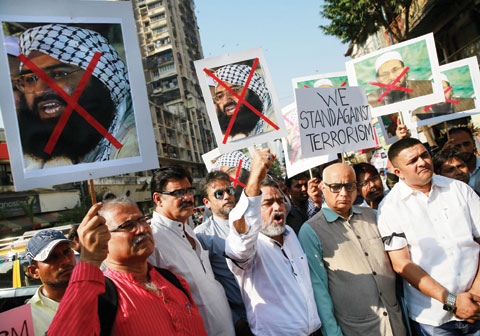 rMUMBAI: Indian protestors shout slogans holding placards with pictures of Pakistani Mujahiddeen leader Masood Azhar, left and Jama’at-ud-Da’wah chief Hafiz Muhammad Saeed, right, as they condemn the attack on the Pathankot air force base. — AP
rMUMBAI: Indian protestors shout slogans holding placards with pictures of Pakistani Mujahiddeen leader Masood Azhar, left and Jama’at-ud-Da’wah chief Hafiz Muhammad Saeed, right, as they condemn the attack on the Pathankot air force base. — APNEW DELHI: India rescheduled high-level peace talks with Pakistan yesterday while it evaluated actions taken by Islamabad against Pakistan-based insurgents it blames for an attack on an Indian air force base earlier this month. Top diplomats were scheduled to meet in the Pakistani capital today to set out a roadmap for talks on settling the Kashmir dispute and other irritants in their ties. Vikas Swarup, India's External Affairs Ministry spokesman, told reporters that the meeting will now be held in "the very near future."
He denied speculation that the talks would collapse because of the attack. In Islamabad, Foreign Ministry spokesman Qazi Khallullah said Pakistan and India had agreed to reschedule the foreign secretary-level talks in the very near future. He refused to provide any further details. India welcomed Pakistan's announcement on Wednesday of the arrest of several people from an outlawed Islamic militant group believed to be linked to the assault in Pathankot close to India's border with Pakistan. Seven Indian soldiers and six attackers died.
"The (Pakistani) statement conveys that considerable progress has been made in the investigations being carried out against terrorist elements linked to the Pathankot incident," Indian spokesman Swarup said. "The action against the Jaish-e-Mohammad (group) is an important and positive first step," he said.
He also said India was looking forward to a possible visit by a team of Pakistani investigating agencies to probe the attack on the air base. India has long accused Pakistan of turning a blind eye to Islamic militants who have staged cross-border attacks and battled Indian forces in the disputed Kashmir region.
Indian Prime Minister Narendra Modi made a surprise visit to Pakistan last month which was seen as a potential sign of thawing relations between the two nuclear-armed neighbors. The two heads of government also had an unscheduled meeting at the Paris climate change talks last month. Since gaining independence from Britain in 1947, India and Pakistan have fought three wars, two of them over Kashmir, the Himalayan region that both countries claim.
India accuses Pakistan of arming and training insurgents fighting for the independence of Indian-controlled Kashmir or its merger with Pakistan. Pakistan denies the charge and says it only provides moral and diplomatic support to the rebels. - AP










